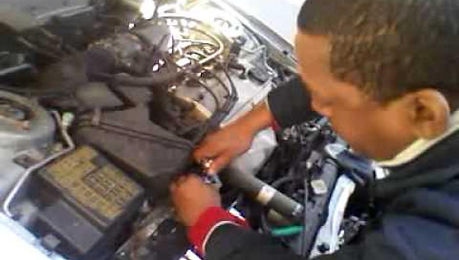
Engine Work:
Troubleshooting engine problems can be very difficult. This is true if you’re not aware of the possible causes of the problem. This is a list of some common causes of engine trouble:
Running Problems for the Engine:
"Rough Idle"

1. It is a failing engine-temperature sensor if the car starts when cold but idles rough and, if the engine does not stay running. When the engine starts, this sensor may send a wrong temperature signal to the DME control unit to provide a richer idle mixture. The Digital Motor Electronic unit “leans” the fuel mixture, thinking the engine is at normal operating temperature. This causes the engine to run rough.
2. The problem may be bad plug wires, distributor, or rotor if the car idles rough. One way to check for bad plug wires is to inspect the plug wires with the engine running - in a very dark area. If the plug wires are bad, you can see electrical arcing to the cylinder head or fuel rail.
3. If the car idles rough or cuts off at low RPM at idle, another cause could be a failing O2 oxygen sensor.
4. A rough idle can also be caused by a problem with the air flow box. The damper for the air flow box can fail mechanically or the contacts inside the box can get dirty and send an errant signal to the DME control unit. This can be corrected by cleaning the electrical contacts inside the air box. This requires removing the cover on the air box. Remove the cover and clean the circuit board inside the box with a contact cleaner and then reattach the cover.
5. If the car experiences a rough idle or if the idle fluctuates, this can indicate a sticking idle stabilizer valve. The valve can be removed and cleaned but, this is just a temporary fix. The valve should be replaced.
"Difficult Starting"
1. If the car is difficult to crank after sitting for several hours, the fuel-return regulator or fuel-pump check valve could be faulty.
2. If the car is difficult to start when warm, the fuel-pump check valve, fuel-return regulator, or individual fuel injector could be leaking.
3. If the car starts easily when cold, but is difficult to start when warm, this may be a failing DME relay. If the car is stopped, the temperature of the relay creates a high resistance to keep the relay from picking up, if the car is started again. When the relay cools and the resistance decreases, the relay will again function normally.
4. If the car is hard to start or if it only fires part of the time and then dies, this could be a problem with the distributor cap or rotor. The car will not fire at all or will only fire momentarily when the rotor is in line with the correct cylinder.
5. If the car is difficult to start when cold, it could be a problem with the engine speed or reference sensors. One of the sensors sends a signal to the DME. The DME uses these signals to time the pulses to the ignition coil and the firing of the fuel injectors. If the sensors do not send the proper signal to the DME, the result is a failure to get proper spark from the ignition coil. Sometimes, failure may be a result of debris building up on the ends of the sensors. If so, cleaning the ends of the sensor may get them working again.
6. If the car is difficult to start, or will not start at all regardless of the operating temperature, there are a number of possible causes:
DME Control Unit -
DME Relay -
Security System Control Unit -
Fuel Pump -
Fuel Pump Fuse -
Distributor Cap, Rotor,Coil, orPrimary Coil Wire -
Engine Speed and/or Reference Sensors -
A fuel pressure gauge, spark tester, and a voltmeter are extremely useful in narrowing down the possible causes of engine problems.




